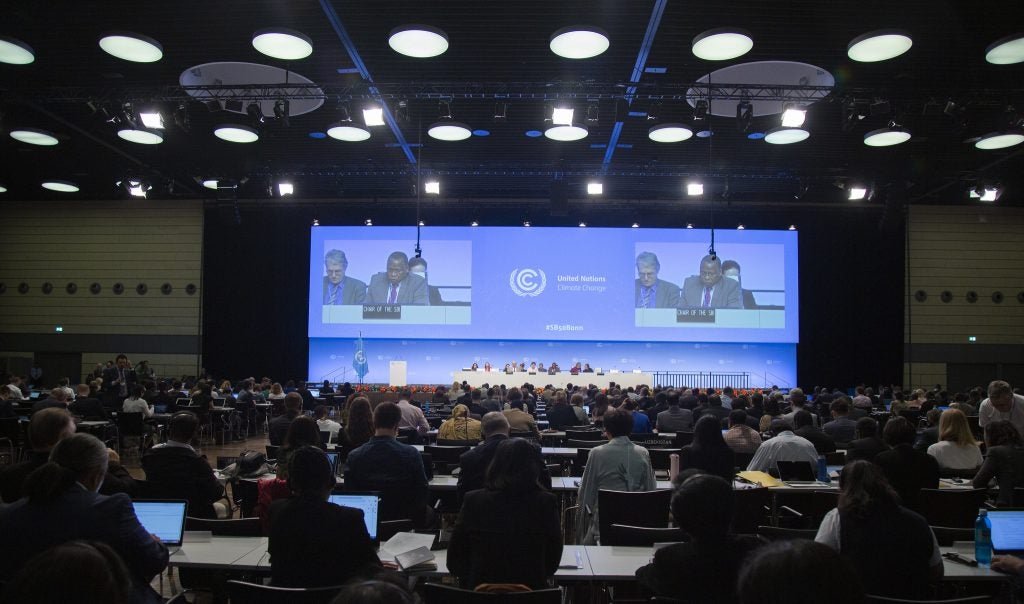This post was co-authored by Julia Ilhardt, High Meadows Fellow at Environmental Defense Fund

Opening Plenary of Subsidiary Body for Implementation (SBI), 2019 climate negotiations in Bonn, Germany. UNclimatechange via Flickr.
Next week, climate negotiators will begin two weeks of meetings in Bonn, Germany to make progress on a full slate of issues—from carbon markets and finance to adaptation and loss and damage—before November’s global climate talks.
At these mid-year negotiating sessions, negotiators will continue to elaborate rules for international carbon markets, kick off dialogues on the global stocktake, and start work on critical processes to address the impacts of the climate crisis, among other things. They will build on the work completed at COP26 in Glasgow last year, and the results will give us an indication of what the upcoming COP27 negotiations in Sharm el-Sheikh, Egypt will look like.
1. Elaborate rules needed to “operationalize” international carbon markets
At COP26 in Glasgow—after six years of difficult, technical negotiations—countries delivered a strong Paris Agreement rulebook for international cooperation through carbon markets. These rules will give countries the tools they need for environmental integrity and ultimately clear a path to get private capital flowing to developing countries.
Now countries need to “operationalize” Article 6 of the Paris Agreement, a process that will be a major focus for negotiators at Bonn. Getting this right could have a real effect on driving climate pollution down, and investment up. Analysis from Environmental Defense Fund estimates that high-integrity international carbon market cooperation could enable countries to nearly double their mitigation ambition at no additional cost, provided they reinvest cost savings in additional emissions reductions.
Operationalizing Article 6 includes elaborating reporting formats and building the infrastructure required to track countries’ use of cooperative approaches, including their use of carbon markets and transfers of credits between countries. It also means standing up a new Supervisory Body to oversee the centralized trading mechanism established under Article 6.4 of the Paris Agreement as a successor to the Clean Development Mechanism. Setting up this infrastructure for cooperation should provide countries with further encouragement to set out more ambitious contributions.
This is an opportunity for countries to rapidly operationalize Article 6 in a way that enables early, transparent, high-integrity carbon market cooperation across all sectors.
2. Kick off the first technical dialogue of the global stocktake process
Negotiators and other stakeholders will also convene for the first technical dialogue of the global stocktake process, a key part of the Paris Agreement’s design to ratchet up ambition over time.
This opportunity to assess countries’ collective progress toward the Paris Agreement’s long-term goals will occur in three phases: information collection and preparation, technical assessment—kicking off in Bonn next week—and consideration of outputs.
As the technical dialogue gets underway, participants should focus on ensuring that the global stocktake distills critical signals from the vast amount of information available to decisionmakers. The process should not only acknowledge existing ambition gaps but also identify opportunities to enhance the implementation of solutions, including opportunities for deep emissions cuts that can be implemented in this critical decade.
EDF is working with the Center for Climate and Energy Solutions (C2ES) to ensure a meaningful global stocktake outcome that would help countries implement existing climate commitments and provide the impetus and information for them to raise the ambition of their next round of climate commitments.
3. Start work on crucial processes to address the impacts of the climate crisis
Developing countries brought the urgent need to address the impacts of the climate crisis to the forefront of the agenda at COP26, and this will continue to be a priority issue at COP27 and beyond.
Last year, in response to calls to address economic and non-economic loss and damage from climate change, negotiators established the Glasgow Dialogue. The first formal meetings of the three-year process will take place in Bonn, where countries will discuss funding arrangements for efforts to avert, minimize, and address the unavoidable consequences of climate change. To date, only a handful of countries have committed such funding.
Alongside loss and damage, adaptation will be a critical issue at the upcoming negotiations, which will feature the kickoff workshop for the Glasgow-Sharm el Sheikh Work Programme on the Global Goal on Adaptation, otherwise known as the GLaSS work program. This is meant to enhance understanding of—and help review progress toward—the Global Goal on Adaptation, which aims to enhance adaptive capacity, strengthen resilience, and reduce vulnerability to climate change. EDF’s recent submission to the UNFCCC highlighted lessons learned from our efforts to develop solutions with farmers, fishers, and coastal communities.
Negotiators have an opportunity in Bonn to advance work on international carbon markets, kick off an impactful global stocktake, and focus on critical processes to address the impacts of the climate crisis. These meetings will set the tone and shape the issues they’ll need to tackle in the coming months, on the road to COP27 in Egypt.









